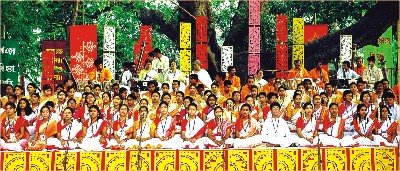Saturday, April 15, 2006
Pahela Baishakh celebrations and Chhayanat

The historical importance of Pahela Baishakh in Bangladesh dates back to the observance of the day by Chhayanat, a leading cultural organisation of the country, in 1967. In an attempt to suppress Bengali culture the Pakistani rulers had banned poems of Rabindranath Togore. Protesting the move, Chhayanat opened its Pahela Baishakh celebrations at Ramna Park with Tagore's song Esho Hey Baishakh, Esho, Esho...welcoming the month. People from all walks of life took part in the programme singing the song along with the artistes. Since then Pahela Baishakh, the first day of Bangla calendar, is celebrated with traditional festivities across the country. In keeping with the age-old tradition, different socio-cultural organisations draw up colourful programmes to celebrate the day.
The day's first programme begins at Ramna Batamul, early in the morning, which is traditionally organised by Chhayanat. This organisation popularised the festival among the urban people. Subsequently, the history of Chhayanat and that of Pahela Baishakh celebration in Dhaka City have become interwoven. And it has a unique history of bold defiance and resistance that has immensely enriched our culture.
To nurture the cultural and musical heritage of Bengal, after the celebration of the birth centennial of Rabindranath Tagore, a group of cultural activists founded Chhayanat in 1961 in Dhaka. Poet Sufia Kamal was the founder president while Farida Hasan was the general secretary of the organisation. Mrs Mohiuddin, Saifuddin Ahmed Manik, Mokhlesur Rahman, Ahmedur Rahman, Wahidul Haq, Sanjida Khatun, Kamal Lohani were members.
Chhayanat's first public function, Purano Ganer Asar (Programme of old songs), was held in Dhaka under the direction of Abdul Ahad. It was highly appreciated by the audience. Later, Chhayanat formed its 'Sangit Vidyayatan' on Pahela Baishakh, 1963 to promote the Bengali culture. In those days they used to arrange indoor programmes. However, the endeavours to promote and popularise Bengali culture especially Tagore's song faced hurdles from the then Pakistan military regime. In defiance the organisation took the bold decision to arrange an open-air programme to take their activities closer to the masses.
In 1967, at the initiative of acclaimed Tagore song singer Sanjida Khatun, Pahela Baishakh was celebrated enthusiastically under the banyan tree inside the Ramna Park. Subsequently, Pahela Baishakh celebrations have become an annual programme of Chhayanat. Except in 1971, the year of liberation war of Bangladesh, the organisation has been regularly holding Pahela Baishakh celebration at the same venue.
In its long journey of celebration of Pahela Baishakh, Chhayanat has faced obstacles from the government and other organisations. Frequently it had to shift its school, Chhayanat Sangit Vidyayatan, from one place to another. Khairul Anam Shakil, the current general secretary of Chhayanat, said, “In 2000 during the bomb blasts by the fanatics in our Pahela Baishakh celebration, we became a little worried. And then we sat with the guardians of our students. We got enormous support from them and this encouraged us to continue the yearly celebration.”
Nowadays, Pahela Baishakh celebration has become part of our urban culture. A large number of people wearing traditional dresses attend the programme where the members of Chhyanat perform at the 'Ramna Batumul' to begin the festive occasion. It is not their own programme, rather a programme of the Bengalis. That is why when the sun sends its golden rays down on earth in the 'first morning' of Bangla Year, people enthusiastically go to Ramna Batomul. More than a cultural event, Pahela Baishakh has become an integral part of the traditional culture of the urban dwellers. Panta-ilish, khoi-moori and other traditional foods become the menu of the urban people who go there to participate in the celebration. Khairul Anam Shakil said, “Besides, students and teachers of Chhayanat, renowned guest artistes also perform in the Ramna Batomul programme. We invite two recitors and two/three singers to participate in the celebrations. As the programme is for only over two hours we can't invite many.”
Following Chhayanat, several organisations also arrange programmes on the day. Students and teachers of Institute of Fine Arts (IFA) of Dhaka University bring out a colourful procession from the Institute premises carrying festoons, placards, posters, banners and wearing masks to welcome the Bangla New Year. Moreover, Bangla Academy and Shilpakala Academy organise programmes at the respective premises. Jatiya Press club, Bulbul Lalita Kala Academy, Liberation War Museum, and Bangladesh National Museum also organise cultural functions on the occasion.